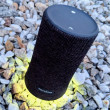BlackBerry
BlackBerry OS Devices Stop Working January 5th
Old BlackBerry devices running BlackBerry OS (10, 7.1, and earlier) will "no longer reliably function" after January 4th. 2022. BlackBerry will shut down its back-end infrastructure for these devices, which may impact the ability of BlackBerry devices to access voice, data, and messaging services, including 911 emergency calls. This does not affect Android-based BlackBerry devices. For affected customers that need help moving to a new device, BlackBerry recommends contacting your wireless carrier. BlackBerry exited the consumer device business years ago. The last BlackBerry OS devices were the BlackBerry Passport and BlackBerry Classic, both of which debuted in 2015 and were discontinued in 2016.
5G BlackBerry Coming in 2021
A new company, OnwardMobility, is picking up the BlackBerry torch. OnwardMobility is licensing the BlackBerry brand and promises a 5G BlackBerry phone with a physical keyboard in North America and Europe in the first half of 2021. OnwardMobility will be responsible for product planning and market development, while FIH Mobile — a subsidiary of Foxconn — will handle design and manufacturing, "under strict guidelines to ensure component, device and supply chain integrity." The last company to make BlackBerry-branded phones was TCL, which launched a handful of Android-based BlackBerry phones from 2016 to 2018.
TCL Kills Off BlackBerry Lineup
TCL Communication and BlackBerry Limited have announced an end to their partnership to produce BlackBerry phones. TCL made several BlackBerry phones in recent years, which ran Android with additional software from BlackBerry Limited. TCL will not introduce any additional BlackBerry phones, and will stop selling existing models at the end of August 2020. It will provide service and support for those phones until the end of August 2022. TCL made four BlackBerry models: The KEYone, KEY2, and KEY2 LE had physical QWERTY keyboards, while the Motion was a touchscreen-only device.
BlackBerry Key2 Red Edition Available Today
The Red Edition of the BlackBerry Key2 launches today with Best Buy and Amazon for $699. The Red Edition has more storage (128 GB) than the standard Key2 and comes with matching earbuds.

BlackBerry Key2 Now Comes in Red
The BlackBerry Key2 will soon be available in a new Red Edition, which comes standard with 128 GB of storage (a step-up option on the standard Key2). The Key2 Red Edition also comes with an exclusive red BlackBerry-branded earbuds. This new edition is otherwise similar to the existing Key2, not to be confused with the lower-end Key2 LE. The Key2 has a metal body, Snapdragon 660 processor, 6 GB of RAM, 3,500 mAh battery, and both standard and telephoto cameras on the back. Naturally it has the signature QWERTY physical keyboard and BlackBerry messaging and security software.
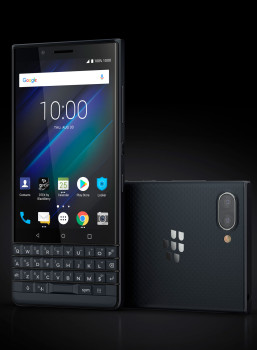
BlackBerry Key2 LE Coming to Verizon
Verizon business customers will soon have access to the newest BlackBerry, the Key2 LE. TCL Communication, which makes BlackBerry phones, announced today that the phone will launch in the "coming weeks" via business channels. The variant for Verizon will have dual-SIM support, 4 GB of RAM, and 64 GB of internal storage. The Key2 LE has a physical QWERTY keyboard, HD screen, Qualcomm Snapdragon 636 processor, fingerprint reader, USB-C connector, fast charging, 3.5mm audio jack, and dual rear cameras.
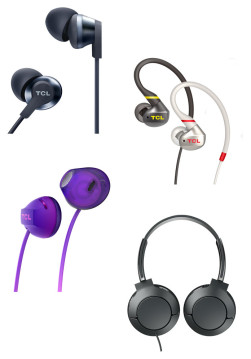
TCL Launching Headphone Lineup in US
TCL — maker of Alcatel and BlackBerry phones as well as TVs under their own brand — is getting into the affordable headphone business. The company today announced its first lineup of TCL-branded wired and Bluetooth personal audio devices for the US, with four sub-brands. ELIT are the top-end models; some have drivers as large as 40mm and/and active noice canceling, ranging in cost $25-80. The ACTV line includes two models with sweat resistance and over-ear loops to keep them in place during workouts. The wired model is $20 while the Bluetooth is $40. The SOCL line are colorful and start at $10 for the basic wired model. The six models top out at $60 for the top-end Bluetooth 5 model with neck band and 18-hour battery life. The MTRO series has more conservative designs, and includes four models: in-ear and over-ear, each available wired or with Bluetooth. They range $20-50. The first models will launch February 1st, with the full lineup available by summer.
Facebook Files Countersuit Against BlackBerry Over Patents
Facebook has filed a lawsuit against BlackBerry in California, claiming the company is violating six patents that pertain to voice messaging technology, graphics, audio, video, and GPS tracking. Facebook is seeking unspecified damages. BlackBerry sued Facebook, Instagram, and WhatsApp earlier this year over messaging technology. Both companies claim the other used their patented technology without permission. BlackBerry did not immediately comment on Facebook’s litigation.
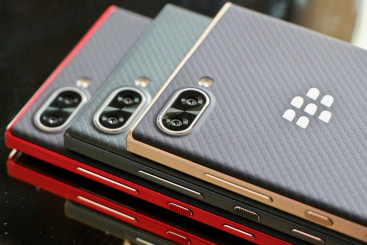
Hands On with the BlackBerry KEY2 LE
TCL has a new BlackBerry on deck for keyboard lovers. The KEY2 LE is a stripped-down version of the KEY2. It carries over the same basic form factor, but changes up the materials and colors to give it some flair for mass market adopters. Here are Phone Scoop's first impressions of the latest 'berry from TCL.
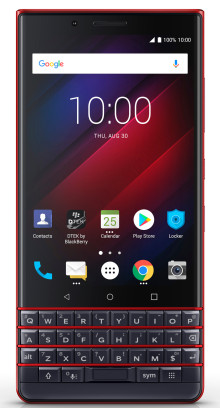
BlackBerry KEY2 LE Sheds Metal Frame, Adds a Splash of Color
TCL today announced the BlackBerry KEY2 LE, a mass-market smartphone with a keyboard. The phone is a scaled back variant of the KEY2 with a new exterior. Gone is the rigid metal build and in its place is a polycarbonate frame with a soft-touch material on the rear surface. The KEY2 LE comes in three color combos: slate, champagne, and atomic red. The latter two have contrasting shades to give them more personality. The LE is less buttoned-down than the standard KEY2. The screen is the same size and resolution (4.5 inches, full HD) as the original. One area where TCL moved to cut costs was the keyboard. The keys are the same shape as those on the pricier KEY2, but the keyboard loses capacitive touch support. The phone is powered by a Qualcomm 636 processor with 4 GB of RAM and 32 or 64 GB of storage. A dual-camera system graces the rear of the phone and a selfie camera is on front. The main shooter is a 13-megapixel job at f/2.2 and the secondary sensor is a 5-megapixel job at f/2.4. Other hardware features include 3.5mm headphone jack, USB-C, and the dedicated speed key on the keyboard. The phone has a 3,000mAh battery with Quick Charge 3.0. Of note, TCL says the KEY2 LE will be compatible with more networks. It will be able to operate on Verizon's network as an LTE-only phone. It is also compatible with AT&T and T-Mobile. TCL has lined up a wide number of retail and carrier distribution points for the phone, which goes on sale for $399 / 32 GB and $449 / 64 GB at the end of September.
BlackBerry Updates Core Android Apps for Key2 and Others
BlackBerry today announced updates to many of its productivity apps for Android devices. For example, the BlackBerry calendar now offers a month view with a refined picker for selecting times/dates when creating appointments. The contacts app is streamlined with automatic field population to speed up the process of creating new contacts. BlackBerry’s DTEK security software sees a significant number of updates. For example, the app’s home screen has been overhauled with a new dashboard to better show the phone’s stauts. Notifications and applications can be more finely tuned via new permissions settings. Further, DTEK will scan the phone at least once per week to make sure the device is up to date. The privacy shade should be easier to turn on thanks to new home screen controls, and the power management center should be more efficient and offer more useful alerts. All these apps are free to download individually from the Google Play Store.

BlackBerry KEY2 Goes On Sale July 13
TCL today said the BlackBerry KEY2 will be available to preorder starting June 29 with an expected retail date of July 13. The phone will be sold unlocked from Amazon and Best Buy for $649. The KEY2, announced earlier this month, has a redesigned chassis, taller keyboard with better keys, and dual rear cameras. Other features include a Snapdragon 660 processor, 6 GB of RAM, and 128 GB of storage. The phone runs Android 8 Oreo with BlackBerry's hardened security and business communication software. The KEY2 has a 4.5-inch screen and 3,500mAh battery.
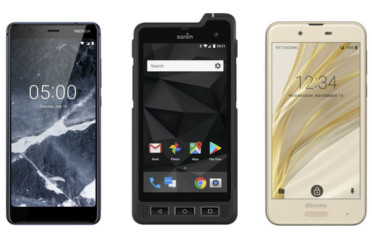
Google Expands Enterprise Recommendation Program to More Phones
Google today said more phone makers now part of its Android Enterprise Recommended program. The Android Enterprise Recommended program, which was launched in February of this year, "establishes best practices and common requirements for devices and services, backed by a thorough testing process conducted by Google." In order to qualify, devices have to meet a number of specifications concerning their hardware, deployment, security updates, and user help programs. For example, devices approved must run at least Android 7 Nougat, and receive security updates no later than 90 days from their release from Google. A handful of new phones makers and devices are now recommended by Google, making for a total of 39 devices from nine device makers. New entries include the Sonim XP8; Sharp Aquos SH 10-K; Sony Xperia XZ2 and XZ2 Compact; Motorola Moto G6, Moto G6 Plus, and Z3 Play; Huawei P20 and P20 Pro; BlackBerry KEY2; and HMD Global Nokia 3.1, 5.1, 6, 7 Plus, and 8 Sirocco. Several tablets have been certified for Android Enterprise Recommended, too, including the Huawei M5 8.4 and 10.8. Google says it will continue to update the list of devices recommended for business users as more phone makers commit to the requirements of the Android Enterprise Recommended program.
AT&T-Run FirstNet More Generally Available to First Responders
AT&T today said fire, medical, police, and other first responders now have more access to its FirstNet network. FirstNet has been available for purchase by agencies, but hasn't been directly sold in stores. Beginning today, any verified first responder can walk into one of AT&T's 5,300 retail shops and initiate service with a new device. The retail availability of FirstNet will be a boon to first responders who volunteer and/or aren't issued communications devices by their agency or local government. A fairly wide number of phones are compatible with FirstNet, including the Samsung Galaxy S8, S8 Plus, S8 Active, Note 8, S9, S9 Plus, and J3; Apple iPhone 6/Plus, 6s/Plus, 7/Plus, 8/Plus, and X; LG V35 ThinQ; Motorola Moto G6 Play; Sonim XP5S and XP8; BlackBerry KEYone; and the Nighthawk LTE Mobile Hotspot Router. The public safety network is available nationwide in its own, reserved spectrum (Band 14). First responders may also sign up for FirstNet service using AT&T's web site.

Hands On with the BlackBerry KEY2
TCL gave its BlackBerry phone a total makeover and hit all the right spots. The phone is easier on the eyes, easier to hold and use, and more powerful than ever thanks to improved specs. With two rear cameras and portrait shooting, Android 8.1 Oreo with BlackBerry Hub+ and DTEK, and a retooled keyboard that's more responsive, there's lots to like about the latest 'Berry. Here are Phone Scoop's first impressions.
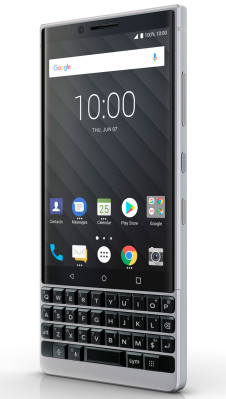
BlackBerry KEY2 Makes All The Right Upgrades
TCL today announced the KEY2, a second-generation BlackBerry phone that combines a large screen, full QWERTY keyboard, and hardened Android software in an aluminum body. The company made a number of changes to the chassis in order to resolve consumer pain points. It has a sleek metal body that has fewer sharp edges. TCL reworked the soft touch rear panel and gave it a new diamond pattern. The KEY2 carries over the 4.5-inch full HD screen of the original with 2.5D curved Gorilla Glass. TCL reduced the forehead and chin in order to accommodate a taller keyboard, which has been completely redesigned. The physical keyboard supports trackpad functionality and includes a new fingerprint reader in the space bar. The KEY2 introduces what TCL calls the Speed Key, which is a universal shortcut key that is user programmable. Internal specs include a Snapdragon 660 processor with 6 GB of RAM, 64 GB or 128 GB of storage, and space for a microSD card up to 1 TB. The battery measures 3,500mAh and TCL claims it delivers two days of use. The battery charges rapidly thanks to support for Quick Charge 3.0. The rear includes two 12-megapixel cameras. The main lens has a 79.3-degree field of view and aperture of f/1.8, while the second has a 50-degree field of view and an aperture of f/2.6. The second sensor is meant to help with depth information for portrait-style shots. Other camera features include PDAF, 4K video capture, and two-tone LED flash. The front camera boasts an 8-megapixel sensor with an display-based selfie flash and full HD video capture. The phone runs Android 8.1 with BlackBerry Hub+ and the company's DTEK security software. The KEY2 will be sold in several variants around the world. TCL says one version will work well in the U.S., including on the networks operated by AT&T, Sprint, T-Mobile, and Verizon Wireless. The BlackBerry KEY2 costs $649 and goes on sale globally this month.
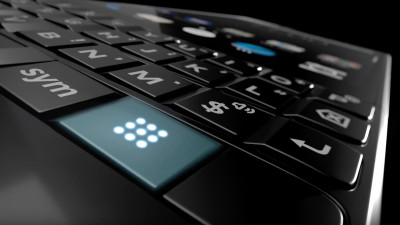
BlackBerry Teases More of the BlackBerry Key2
BlackBerry today provided another speak peak at the forthcoming Key2 smartphone. Like the original, the phone will include a touch screen and physical QWERTY keyboard. The teaser video released today shows that the phone will include two cameras on the rear along with a dual-LED flash. The device is scheduled to be unveiled at an event on June 7.
BlackBerry Updates Slew Of Productivity Apps
BlackBerry has pushed out updates to the majority of its Android productivity applications. First up, the BlackBerry Hub. The Hub has improved message filing to let users file sent messages in email threads. This is meant to help keep the Hub less cluttered. The calendar features navigation improvements that make it easier to page through months and years at a time. The BlackBerry keyboard app now supports flick typing for Chinese and Japanese, and includes SlideBoard enhancements that make it possible to use Slideboard when swipe typing is enabled. The BlackBerry Launcher gains inline notifications that are easier to manage from the notification shade. The Launcher also makes it easier to read and flag messages for followup. The contacts app should work better with business contact systems. For example, text messages viewed in the Hub will now resolve the Android for Work Contact and display the contact name instead of the phone number. Moreover, it is now easier to create new contacts on the fly. Last, BlackBerry Notes & Tasks makes it simpler to create new notes and tasks. All these app updates are available individually via the Google Play Store.
BlackBerry Sues Snap Over Messaging Patents
BlackBerry has filed a lawsuit against Snap Inc., alleging that the latter company's social network is infringing in BlackBerry's messaging patents. The patents in question were awarded to BlackBerry between 2012 and 2014 and cover a range of technologies concerning mobile messaging. Snap is the creator of the Snapchat app, a service popular for sharing ephemeral messages and stories. "BlackBerry has a well-earned reputation for protecting and securing our customers' data and privacy. For more than a year we have been working to establish a dialogue with Snap as we believe there are far more opportunities for partnership than disagreement. While we continue to hold this door open, we also have a strong claim that Snap infringed on our intellectual property, harmed our shareholders, and we have an obligation to pursue appropriate legal remedies," said BlackBerry in a statement. BlackBerry filed similar lawsuits against Facebook, WhatsApp, and Instagram last month. BlackBerry's core business is selling enterprise-grade software and services, but patent litigation has become part of BlackBerry's business strategy under CEO John Chen. TCL now manufactures BlackBerry-branded handsets. Snap did not immediately respond to the lawsuit.
BlackBerry Debuts ‘Fan League’ for Enthusiasts
BlackBerry Mobile today kicked off the BlackBerry Fan League, a way for BlackBerry smartphone enthusiasts to connect with the brand. BlackBerry says participants will have the opportunity to win prizes, including smartphones, as well as participate in surveys and beta programs, and interface directly with the BlackBerry Mobile team. Members can earn points by re-sharing official BlackBerry social media posts, creating their own BlackBerry-themed content, and recruiting new members. Points are what allow members to enter drawings for the weekly prizes. The BlackBerry Smartphone Fan League is available to all BlackBerry owners in the U.S., Canada, and the U.K. BlackBerry Mobile handsets are designed and sold by TCL.
BlackBerry and Microsoft Partner On Mobile Services
BlackBerry and Microsoft announced a new partnership that will see the two deliver mobile software and services to businesses customers. A new solution, called BlackBerry Bridge, lets business users access Microsoft mobile apps from within BackBerry Dynamics. This means corporate employees will have the same experience opening, editing, and saving Microsoft Office documents on any Android or iOS device. It gives mobile workers a secure way to access their files that are immediately backed up in Microsoft's cloud. Microsoft says the partnership also brings new powers to the IT department, which will better be able to secure company data and maintain privacy while remaining compliant with regulatory statutes. In order to make this work, the companies have integrated BlackBerry UEM Cloud, Workspaces, Dynamics, and AtHoc into the Microsoft Azure cloud platform. Microsoft and BlackBerry didn't specify how quickly these new services will be available to their customers.
Class Action Against BlackBerry Over Handset Sales Can Proceed
BlackBerry's hope to squash a lawsuit has been dashed by a U.S. judge who says the legal proceedings can move forward. Plaintiffs allege BlackBerry "inflated its stock price and defrauded shareholders" by suggesting sales of BlackBerry 10 handsets were much better than they really were. The case was originally dismissed in March 2015, but new evidence suggests there's merit to the accusations. A retailer called Wireless Zone compiled data that showed a high return rate for BlackBerry 10 handsets. James Dunham, former CEO of Wireless Zone, sold that data to Detwiler Fenton, which generated a report detailing consumers' general dissatisfaction with BlackBerry 10 phones. BlackBerry's executives publicly said at the time that Blackberry 10 owners were in fact "satisfied" and the company insisted that return rates for Blackberry 10 handsets were “at or below our forecasts and right in line with the industry." It is these statements, in light of evidence to the contrary, that the plaintiffs say misled investors and eventually led to shareholder losses when BlackBerry 10 collapsed. BlackBerry did not comment on the matter, which now heads to trial.
BlackBerry to Keep John Chen As CEO Through 2023
BlackBerry today said it has extended its contract with CEO John S. Chen, who will serve as chief executive through November 2023. BlackBerry brought Chen on board in 2013 and he oversaw the company's transformation from a hardware business to a software and services business. Chen was responsible for deep spending cuts that helped keep the company from going under. It is now focused on selling mobile device management services to business customers. The company also develops device-side software for Android handsets that allows them to offer secure email, messaging, and other core communications. "The BlackBerry Board of Directors has tremendous confidence in John Chen. John engineered a successful turnaround and has the company repositioned to apply its strengths and assets to the Enterprise of Things, an emerging category with massive potential," said board member Prem Watsa. BlackBerry-branded handsets are designed and sold by TCL, which also designs devices under the Alcatel brand.
BlackBerry Sues Facebook, Instagram, WhatsApp Over Patents
BlackBerry has filed lawsuits against Facebook, Instagram, and WhatsApp, claiming all three violate its patented messaging technology. "Defendants created mobile messaging applications that co-opt BlackBerry’s innovations, using a number of the innovative security, user interface, and functionality enhancing features," said the company in its filings. BlackBerry says it has spent years negotiating with all three companies without coming to terms, leaving it no choice but to take legal action. Patent litigation has become part of BlackBerry's business strategy under CEO John Chen. The company recently filed suit against Nokia over 3G/4G patents and late last year settled litigation against Qualcomm for $940 million. BlackBerry has some 40,000 technology patents it hopes will generate income. Facebook was the only company that responded to the lawsuit publicly. "Blackberry’s suit sadly reflects the current state of its messaging business,” said Facebook General Counsel Paul Grewal. "Having abandoned its efforts to innovate, BlackBerry is now looking to tax the innovation of others." BlackBerry's core business is selling enterprise-grade software and services. TCL now manufactures BlackBerry-branded handsets.
FTC Wants Mobile Industry to Be Better At Security Updates
The current state of mobile device security patches is lacking, according to a new report issued today by the Federal Trade Commission. The FTC studied how Apple, BlackBerry, Google, HTC, LG, Microsoft, Motorola, and Samsung support their devices over time. "Our report found significant differences in how the industry deploys security updates and that more needs to be done to make it easier for consumers to ensure their devices are secure," said Acting Director Tom Pahl. The agency notes that many devices are updated infrequently, if at all, and that manufacturers often fail to deliver on promises. It wants phone makers and carriers to improve the situation. The agency suggested each does a better job of explaining mobile device security to consumers (i.e., make it clear to them that the updates are important and worth installing). The FTC also recommended that phone makers consider issuing security patches as stand-alone updates, rather than bundled with general OS upgrades. The FTC noted that companies that make their own operating system, in this case, Apple and Google, are often better at providing timely updates for a longer period of time. The FTC is calling for members of the mobile industry to find a way to bring clarity to consumers and more rapid security updates.

Android Messages with RCS to Reach More Phones On More Carriers
Google says its Android Messages app is on the upswing thanks to new RCS-based tools and growing support from phone makers and wireless network operators. To start, brands now have more power to interact with consumers thanks to RCS business messaging. Google says brands can "send more useful and interactive messages" to their customers with photos, videos, and links for purchasing. A number of companies have been testing RCS business messaging via Google's Early Access Program. Some include 1-800 Contacts, 1-800-Flowers.com, Booking.com, SnapTravel, and Subway — all on Sprint in the U.S. Google says more businesses will be deploying richer messaging via the Android Messages app over the coming months. The Android Messages app has gained a lot of traction with phone makers and carriers, and more support is on the way. Moving forward, Alcatel, BlackBerry, Transsion, Blu, Positivo, Multilaser, Mobiwire, Azumi, and Essential will all preload Android Messages as the default SMS/messaging app. A number of phone makers already offer Android Messages, including Huawei, LG, HMD Global, HTC, Kyocera, Motorola, Sony, and ZTE. The app has a growing footprint with carriers, as well. Google says America Movil, AT&T in Mexico, Celcom Axiata Berhad, Freedom Mobile, Oi, Telia Company, and Telefonica have joined Deutsche Telekom, Globe Telecom, Orange, Rogers Communications, Sprint, and Telenor in their commitment to launch RCS messaging. Sprint is the lone U.S. carrier to go all-in with Google's RCS and Android Messages. AT&T and Verizon each offers its own RCS-based messaging client for Android handsets. Google believes this new momentum for RCS and Android Messages will eventually mean a better messaging experience between people, brands, and more.
Google Highlights Phones It Recommends for Business Users
Google today announced the Android Enterprise Recommended program and an initial batch of handsets that meet the qualifications. Google says the Android Enterprise Recommended program “establishes best practices and common requirements for devices and services, backed by a thorough testing process conducted by Google.” In order to qualify, devices have to meet a number of specifications concerning their hardware, deployment, security updates, and user help programs. For example, devices approved must run at least Android 7 Nougat, and receive security updates no later than 90 days from their release from Google. Further, device makers must commit to offering security patches to unlocked devices for a minimum of three years. Some of the initial devices that meet the requirements — and are thus recommended for business users — include the Google Pixel, Pixel XL, Pixel 2, and Pixel 2 XL; the BlackBerry KEYone and Motion; the Huawei Mate 10 and Mate 10 Pro; the LG V30 and G6; the Motorola X4 and Z2 ; the Nokia 8; and the Sony Xperia XZ1, XZ Premium, XA2, and XA2 Ultra. Google says it will update the requirements with each new Android platform release to “raise the bar to ensure we are delivering the best experience for our enterprise customers.”
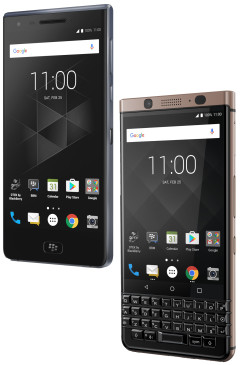
TCL Promises Two New QWERTY BlackBerries as Motion Hits U.S. Stores Jan. 12
TCL Communication today said it plans to introduce two new BlackBerry-branded handsets this year, both of which will feature physical QWERTY keyboards. They will serve as successors to last year's KEYone handset. TCL didn't share any details about these new BlackBerry devices other than to say they'll arrive later in 2018. TCL today also said it plans to sell the BlackBerry Motion smartphone in the U.S. starting January 12. The device has been available overseas since late last year. The BlackBerry Motion will be sold unlocked for $450 from Amazon.com and Best Buy. It supports GSM networks, such as those operated by AT&T and T-Mobile. Later this quarter TCL plans to release a bronze edition KEYone smartphone. Other than the color, the KEYone Bronze Edition changes memory to 4 GB and storage to 64 GB, and adds support for a second SIM card. Exact pricing and availability was not disclosed. Last, BlackBerry and TCL are working to bring Android 8 Oreo to the KEYone and expect to do so in the months ahead.
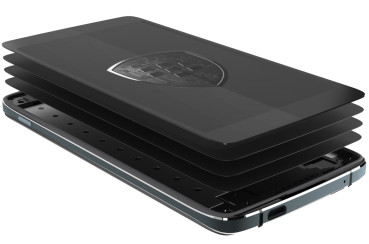
BlackBerry to Cease Monthly Updates for the Priv, Launch Trade-Up Program
BlackBerry said this week that it will no longer provide monthly system and security updates to its BlackBerry Priv smartphone. The company originally committed to providing updates for a period of two years. "Having now stepped outside the original two-year window, we will no longer be delivering monthly updates for the Priv moving forward," said the company. That doesn't mean all support for the phone will stop. The company said it will still honor any warranty obligations it has for hardware repairs. Moreover, BlackBerry claims that its handsets are inherently more secure than most other Android devices thanks to the hardened core and monthly updates up until this point. BlackBerry said if a critical vulnerability is exposed in the Priv, it will work to correct the problem as needed. Last, BlackBerry said it has partnered with BlackBerry Mobile to help legacy BlackBerry owners upgrade to newer hardware. Customers still using the Priv or other BB10 or BBOS devices will soon be able to upgrade to a BlackBerry KEYone or BlackBerry Motion smartphone. Specific details regarding the trade-in program are still in the works.
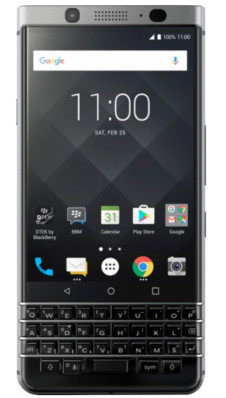
BlackBerry KEYone $100 Off from Amazon and Best Buy
Both Amazon and Best Buy are rolling back the price of the BlackBerry KEYone starting today. The GSM and CDMA variants of the keyboard-equipped smartphone are on sale for $449, a savings of $100 off the normal retail price of $549. The KEYone has a 4.5-inch screen, 12-megapixel camera, Snapdragon 625 processor, Android 7.1 Nougat, and advanced security software. BlackBerry Mobile said the promotion will run though December 24, or as long as supplies last.
BlackBerry to Pay Nokia $137 Million to Settle Dispute
BlackBerry today said it has agreed to pay Nokia a fee of $137 million over payments due for licensing certain patented technology. The decision was reached in the International Court of Arbitration and is binding. This particular disagreement did not pertain to allegations of patent infringement, though BlackBerry is pursuing Nokia for patent infringement in separate cases in Germany and the U.S. BlackBerry said it was disappointed with the court's decision.
Researchers Say WiFi Vulnerability Impacts Nearly Everything
Researchers say they've found a serious gap in the WPA2 security protocol that can allow hackers to use key reinstallation attacks (KRACKs) to compromise most WiFi devices. The researchers say the method allows hackers to read encrypted information transiting via WiFi, including passwords, emails, photos, credit card numbers, and more. KRACKs can access nearly all WiFi traffic and, depending on the individual network safety configuration, insert code and alter data, such as send malware. The researchers claim the weakness is in the WiFi standard itself, and not in individual products, which is why the vulnerability is so widespread. Devices running Android, iOS, Linux, Windows, macOS, and other platforms are impacted. The U.S. Computer Emergency Readiness Team (US-CERT) agreed with the researchers' assessment and warned, "The impact of exploiting these vulnerabilities includes decryption, packet replay, TCP connection hijacking, HTTP content injection, and others. Note that as protocol-level issues, most or all correct implementations of the standard will be affected." In other words, even if WiFi devices are being used properly, with passwords, they are still vulnerable. Google said it is aware of the issue and will patch the vulnerability in a future security update. The WiFi Alliance has not yet responded to the researcher's revelations.
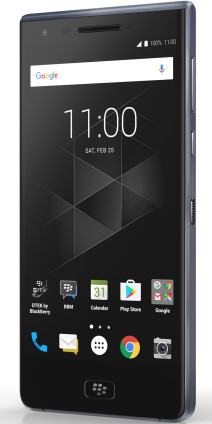
BlackBerry Motion Eschews the Keyboard, Packs Huge Battery
TCL today announced the BlackBerry Motion, a follow-up to the KEYone that drops the keyboard in favor of a larger touch screen. The Motion boasts a 5.5-inch full HD screen that's covered in a nano-diamond coating to prevent scratches. TCL says the phone is the first BlackBerry to carry an IP67 rating for protection from dust and water. The Motion ships with the largest-ever battery for a BlackBerry. The power cell rates 4,000mAh and TCL says it is good for two full days of use. It supports Quick Charge 3.0 for rapid recharges when needed. Other notable hardware features include a programmable convenience key, fingerprint sensor, USB-C, and a standard headphone jack. Under the hood, the BlackBerry Motion is powered by a Qualcomm Snapdragon 625 processor with 4 GB of RAM and 32 GB of storage, with support for microSD memory cards. The rear camera has a 12-megapixel sensor with an f/2.0 lens, flash, and phase-detection autofocus, while the front camera has an 8-megapixel sensor with an f/2.4 lens, flash, and wide-angle field of view. The Motion runs Android 7.1 Nougat with BlackBerry's hardened DTEK software, BlackBerry Hub, and other business-friendly apps on board. A new tool called Locker allows Motion owners to protect photos and other files in a locked folder that can only be opened with a password or fingerprint. The BlackBerry Motion is initially going to be sold in Saudi Arabia and the United Arab Emirates for about $460. TCL said the phone will eventually be sold in other regions, though it didn't specifically say if that includes the U.S.
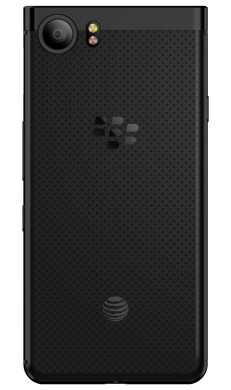
BlackBerry KEYone Coming To AT&T
TCT Mobile and AT&T today announced that the BlackBerry KEYone phone will launch with AT&T on Friday, September 1st, in an exclusive Space Black color. The KEYone was previously only available unlocked or from Sprint. AT&T is selling the phone for $500. The last BlackBerry-brand phone offered by AT&T was the Priv, released in late 2015. The KEYone is the first phone designed and marketed by TCT Mobile — a division of TCL — under an exclusive arrangement with BlackBerry. BlackBerry is involved in the design and software of the phones, but the effort is led by TCT. TCT also operates the Alcatel brand for mobile phones.
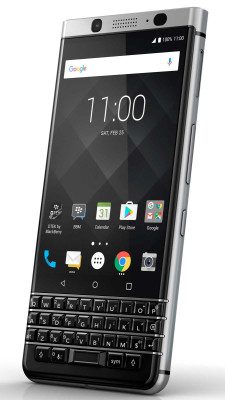
Sprint to Sell BlackBerry KEYone from July 14
Sprint today said that the BlackBerry KEYone smartphone will go on sale July 14. It will initially be available online and via telesales. The phone won't reach stores until later this month. Sprint is charging $528 for the handset, or $22 per month on a payment plan. The KEYone, made by TCL, the parent company of Alcatel, combines a 4.5-inch touch screen with a physical QWERTY keyboard. Other features include a Snapdragon 625 processor, 12-megapixel camera, 3,505mAh battery, and Android 7.1 Nougat with BlackBerry's DTEK security suite.
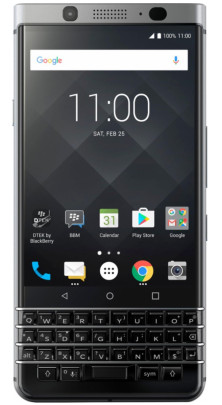
BlackBerry Says CDMA Version of KEYone Now At Best Buy
BlackBerry Mobile today said the Verizon-ready, CDMA model of its KEYone smartphone is available at Best Buy stores. The phone is sold unlocked with support for Verizon's 3G and 4G networks. Earlier versions of the KEYone supported only GSM-based 3G service. The KEYone runs Google's Android operating system with BlackBerry Mobile's security and communications software on board. The phone's defining feature is the physical QWERTY keyboard. It costs $549.
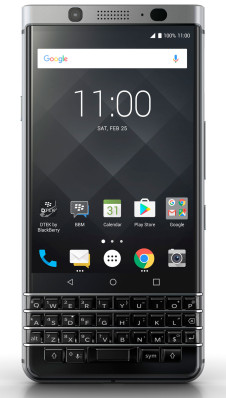
BlackBerry KEYone Goes On Sale Today for $549
TCL today announced that the BlackBerry KEYone, a smartphone it developed with BlackBerry Mobile, is now available for purchase online. The handset includes a 4.5-inch touch display, full QWERTY keyboard, Snapdragon 625 processor, 12-megpixel camera, LTE, and Android 7.1 Nougat with BlackBerry Hub and BlackBerry Messenger. Both the unlocked GSM and CDMA variants of the phone are available online from BestBuy and Amazon. TCL says a limited number of KEYone's will be at select Best Buy retail stores around the country. Sprint plans to sell its own branded variant of the BlackBerry KEYone later this summer.
Qualcomm Must Pay BlackBerry $940M to Settle Royalty Spat
BlackBerry today announced the final award in an arbitration case between it and Qualcomm that was tentatively settled in April. Qualcomm must repay BlackBerry of a total amount of $940 million, including interest and attorneys' fees — a number that's $125 million more than the original award announced last month. The two were disputing "whether Qualcomm's agreement to cap certain royalties applied to payments made by BlackBerry under a license agreement between the parties." The binding arbitration settlement determined that Qualcomm's agreement did in fact apply to such payments, resulting in BlackBerry paying Qualcomm too much money over several years' time. The agreement is final and Qualcomm cannot appeal. Qualcomm will make the full $940 million payment May 31.
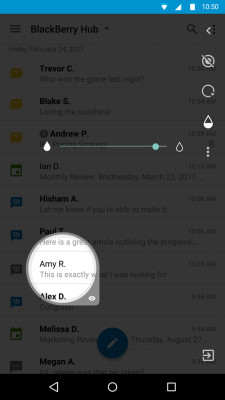
BlackBerry Offering Privacy Shade Tool to All Hub+ Subscribers
BlackBerry today outlined several changes headed to its suite of Android applications, including the general availability of the Privacy Shade. The Privacy Shade was first made available only to BlackBerry-branded handsets, but will soon be available to any Android handset that relies on the BlackBerry Hub+ service. The Privacy Shade lets users adjust the transparency of the filter to suit their surroundings and activate it from the convenience key. Along with the wider availability, Privacy Shade users will also be able to re-size the window. Other new tools include Quick File for moving messages, Google Hangouts notifications, GroupWise mail server out-of-office messages, enhanced message previews when roaming, and the dark theme for the Hub widget. The updates will hit Hub+ in the Google Play Store in the days ahead.
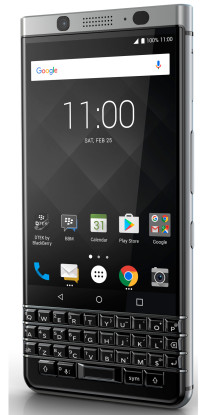
Unlocked BlackBerry Keyone Goes On Sale May 31; Sprint Version Arrives This Summer
TCL today announced that the BlackBerry Keyone, a smartphone it developed with BlackBerry Mobile, will be available to U.S. buyers starting May 31. The handset includes a 4.5-inch touch display and full QWERTY keyboard. Other features include a Snapdragon 625 processor, 12-megpixel camera, LTE, and Android 7.1 Nougat with BlackBerry Hub and BlackBerry Messenger. TCL plans to sell both the unlocked GSM and CDMA variants of the phone directly to consumers online for $549. The company noted that Sprint will sell the phone with service plans later this summer. TCL said more details about the Sprint version will be shared towards the end of May.








